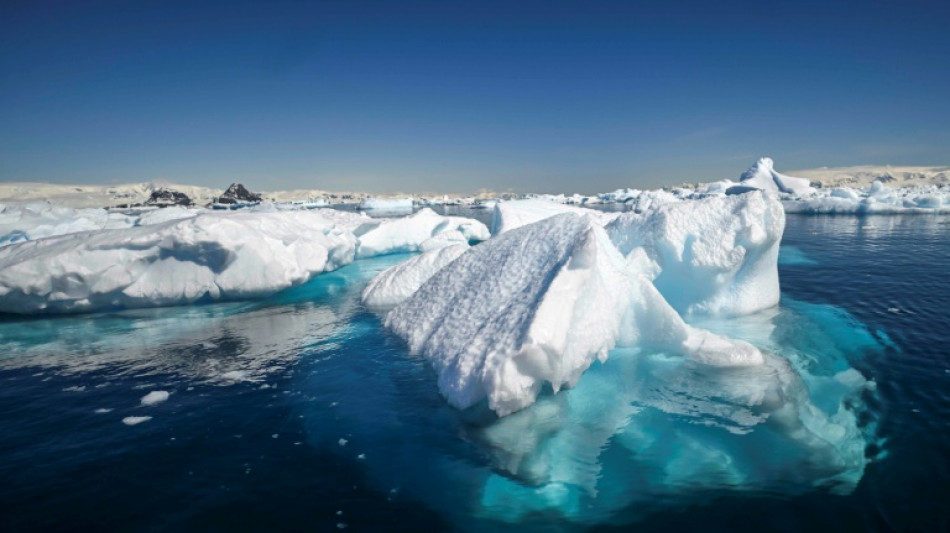
-
 India and Germany eye defence industry boost to ties
India and Germany eye defence industry boost to ties
-
'I know the pain': ex-refugee takes over as UNHCR chief

-
 US prosecutors open criminal probe into Federal Reserve
US prosecutors open criminal probe into Federal Reserve
-
Rohingya 'targeted for destruction' by Myanmar, ICJ hears

-
 'Genius' chimpanzee Ai dies in Japan at 49
'Genius' chimpanzee Ai dies in Japan at 49
-
Trump says US will take Greenland 'one way or the other'

-
 Asian equities, precious metals surge as US Justice Dept targets Fed
Asian equities, precious metals surge as US Justice Dept targets Fed
-
Myanmar pro-military party claims Suu Kyi's seat in junta-run poll

-
 Fed chair Powell says targeted by federal probe
Fed chair Powell says targeted by federal probe
-
Trailblazing Milos Raonic retires from tennis

-
 Australia recalls parliament early to pass hate speech, gun laws
Australia recalls parliament early to pass hate speech, gun laws
-
'One Battle After Another,' 'Hamnet' triumph at Golden Globes

-
 Japan aims to dig deep-sea rare earths to reduce China dependence
Japan aims to dig deep-sea rare earths to reduce China dependence
-
Top UN court to hear Rohingya genocide case against Myanmar

-
 US sends more agents to Minneapolis despite furor over woman's killing
US sends more agents to Minneapolis despite furor over woman's killing
-
Trump says Iran 'want to negotiate' after reports of hundreds killed in protests

-
 Bangladesh's powerful Islamists prepare for elections
Bangladesh's powerful Islamists prepare for elections
-
NBA-best Thunder beat the Heat as T-Wolves edge Spurs

-
 Ukraine's Kostyuk defends 'conscious choice' to speak out about war
Ukraine's Kostyuk defends 'conscious choice' to speak out about war
-
Trump says working well with Venezuela's new leaders, open to meeting

-
 Asian equities edge up, dollar slides as US Fed Reserve subpoenaed
Asian equities edge up, dollar slides as US Fed Reserve subpoenaed
-
Hong Kong court hears sentencing arguments for Jimmy Lai

-
 Powell says Federal Reserve subpoenaed by US Justice Department
Powell says Federal Reserve subpoenaed by US Justice Department
-
Chalamet, 'One Battle' among winners at Golden Globes

-
 Turning point? Canada's tumultuous relationship with China
Turning point? Canada's tumultuous relationship with China
-
Eagles stunned by depleted 49ers, Allen leads Bills fightback

-
 Globes red carpet: chic black, naked dresses and a bit of politics
Globes red carpet: chic black, naked dresses and a bit of politics
-
Maduro's fall raises Venezuelans' hopes for economic bounty

-
 Golden Globes kick off with 'One Battle' among favorites
Golden Globes kick off with 'One Battle' among favorites
-
Australian Open 'underdog' Medvedev says he will be hard to beat

-
 In-form Bencic back in top 10 for first time since having baby
In-form Bencic back in top 10 for first time since having baby
-
Swiatek insists 'everything is fine' after back-to-back defeats

-
 Wildfires spread to 15,000 hectares in Argentine Patagonia
Wildfires spread to 15,000 hectares in Argentine Patagonia
-
Napoli stay in touch with leaders Inter thanks to talisman McTominay

-
 Meta urges Australia to change teen social media ban
Meta urges Australia to change teen social media ban
-
Venezuelans await political prisoners' release after government vow

-
 Lens continue winning streak, Endrick opens Lyon account in French Cup
Lens continue winning streak, Endrick opens Lyon account in French Cup
-
McTominay double gives Napoli precious point at Serie A leaders Inter

-
 Trump admin sends more agents to Minneapolis despite furor over woman's killing
Trump admin sends more agents to Minneapolis despite furor over woman's killing
-
Allen magic leads Bills past Jaguars in playoff thriller

-
 Barca edge Real Madrid in thrilling Spanish Super Cup final
Barca edge Real Madrid in thrilling Spanish Super Cup final
-
Malinin spearheads US Olympic figure skating challenge

-
 Malinin spearheads US figure Olympic figure skating challenge
Malinin spearheads US figure Olympic figure skating challenge
-
Iran rights group warns of 'mass killing', govt calls counter-protests

-
 'Fragile' Man Utd hit new low with FA Cup exit
'Fragile' Man Utd hit new low with FA Cup exit
-
Iran rights group warns of 'mass killing' of protesters

-
 Demonstrators in London, Paris, Istanbul back Iran protests
Demonstrators in London, Paris, Istanbul back Iran protests
-
Olise sparkles as Bayern fire eight past Wolfsburg

-
 Man Utd knocked out of FA Cup by Brighton, Martinelli hits hat-trick for Arsenal
Man Utd knocked out of FA Cup by Brighton, Martinelli hits hat-trick for Arsenal
-
Troubled Man Utd crash out of FA Cup against Brighton


Melting ice could slow vital Antarctic ocean current: study
The world's strongest ocean current could slow as melting Antarctic ice sheets flood it with fresh water, according to research published on Monday that warned of "severe" climate consequences.
Scientists used one of Australia's most powerful supercomputers to model how melting ice sheets might change the Antarctic Circumpolar Current, which plays a major role in global climate patterns.
If fossil fuel emissions increased over the next 25 years -- a so-called high emissions scenario -- the current could slow by around 20 percent, the peer-reviewed research found.
"The ocean is extremely complex and finely balanced," said University of Melbourne scientist Bishakhdatta Gayen.
"If this current 'engine' breaks down, there could be severe consequences, including more climate variability -- with greater extremes in certain regions, and accelerated global warming due to a reduction in the ocean's capacity to act as a carbon sink."
The Antarctic Circumpolar Current acted as a kind of "ocean conveyor belt" shifting immense columns of water through the Indian, Atlantic and Pacific Oceans, Gayen said.
Melting ice sheets would "dump vast quantities of fresh water" into the current, the modelling found.
This would change the ocean's salt content, making it harder for cold water to circulate between the surface and the depths.
Oceans play vital roles as climate regulators and carbon sinks.
Cooler waters can absorb greater amounts of heat from the atmosphere.
The strength of the current -- which flows clockwise around Antarctica -- also acts as a barrier that stops invasive species washing up on the continent's shores.
Algae and molluscs could more easily colonise Antarctica if the current slowed down, the researchers wrote.
Even if global warming was limited to a threshold of 1.5 degrees Celsius, the Antarctic current could still slow down.
"The 2015 Paris Agreement aimed to limit global warming to 1.5 degrees Celsius above pre-industrial levels," said climate scientist and co-author Taimoor Sohail.
"Many scientists agree that we have already reached this 1.5 degree target, and it is likely to get hotter, with flow-on impacts on Antarctic ice melting."
The research team, which included scientists from Australia, India and Norway, noted that their findings contrasted with previous studies that observed the current speeding up.
They said further observation and modelling was needed to understand how the "poorly observed region" was responding to climate change.
The research was published in the Environmental Research Letters journal.
M.AbuKhalil--SF-PST



